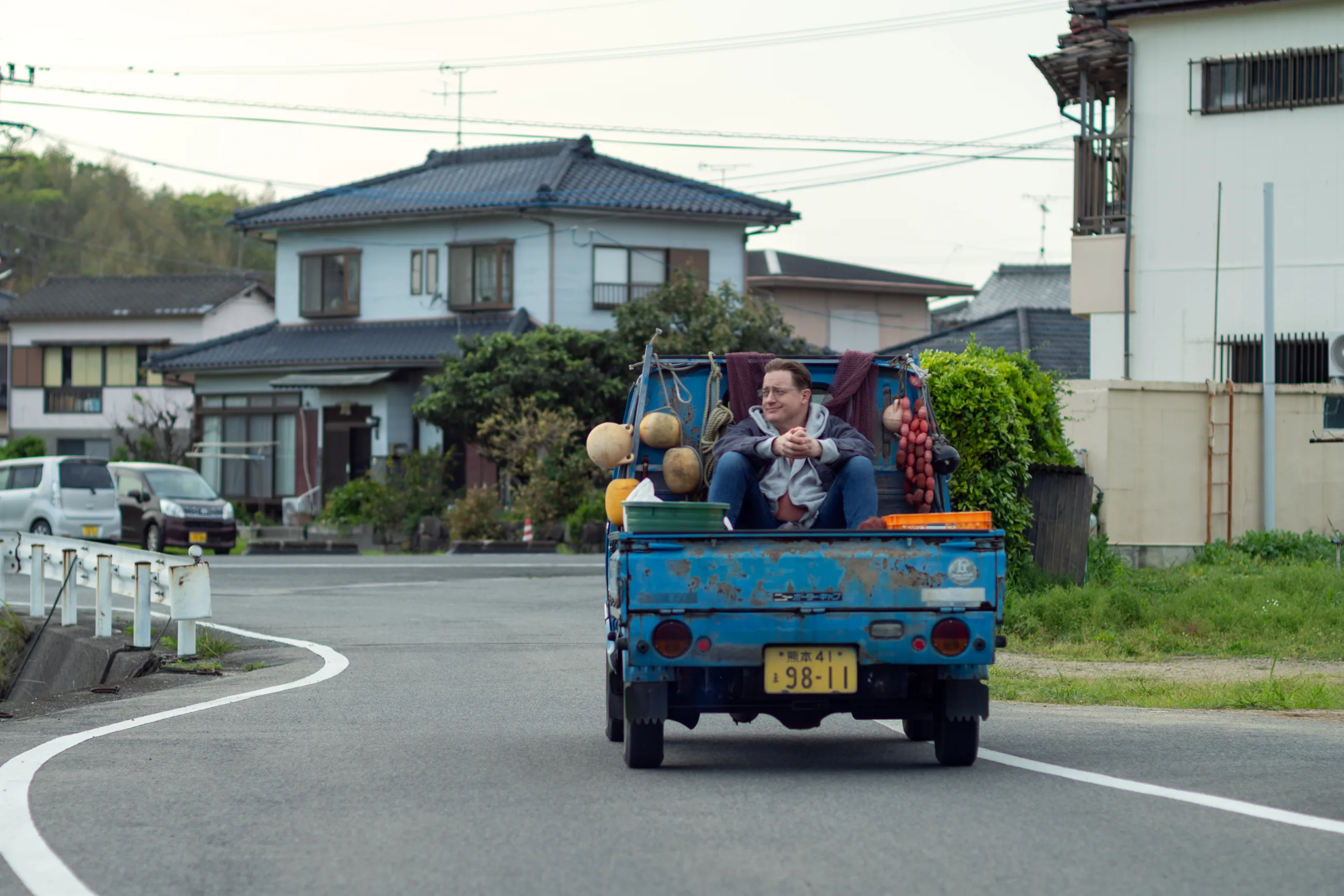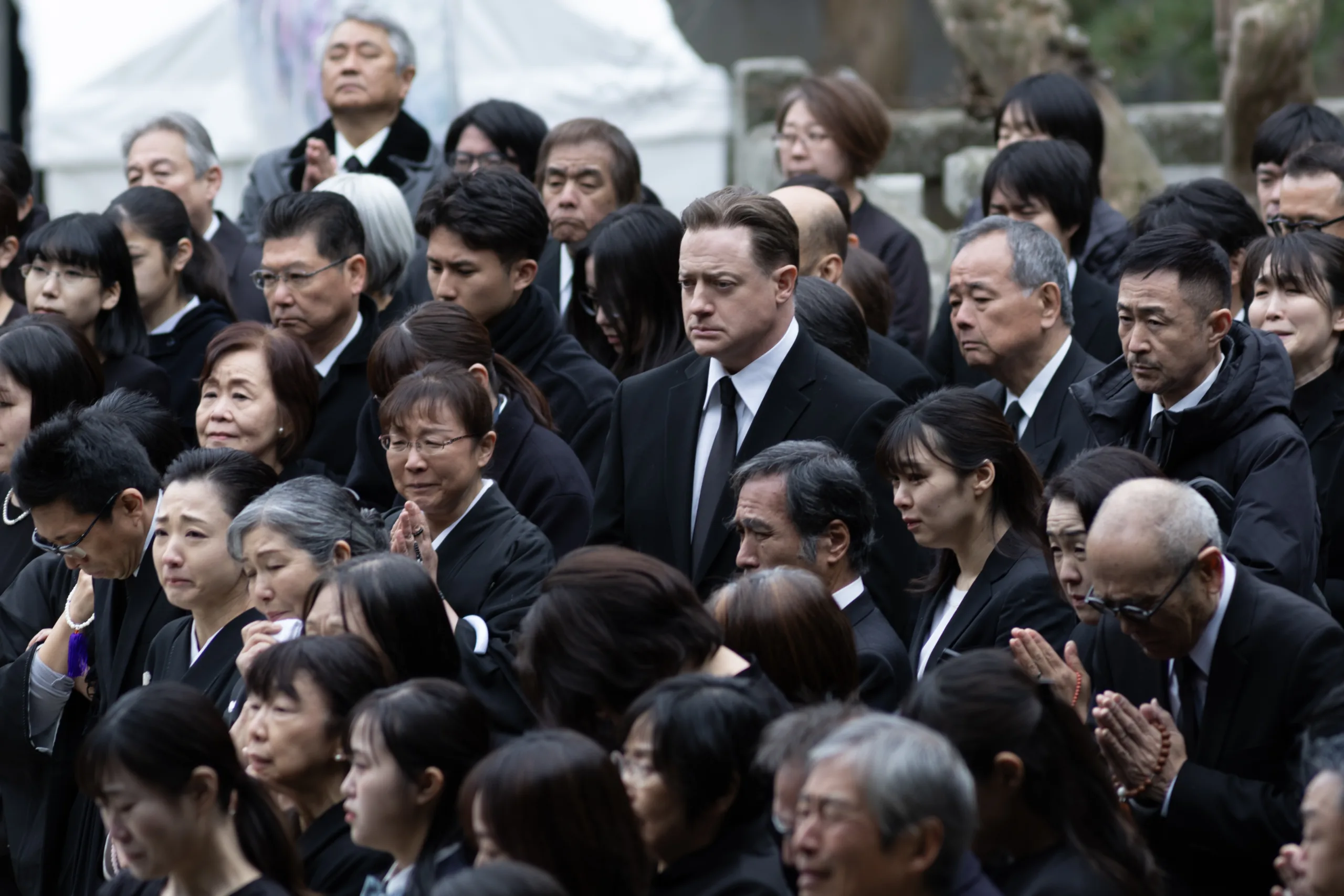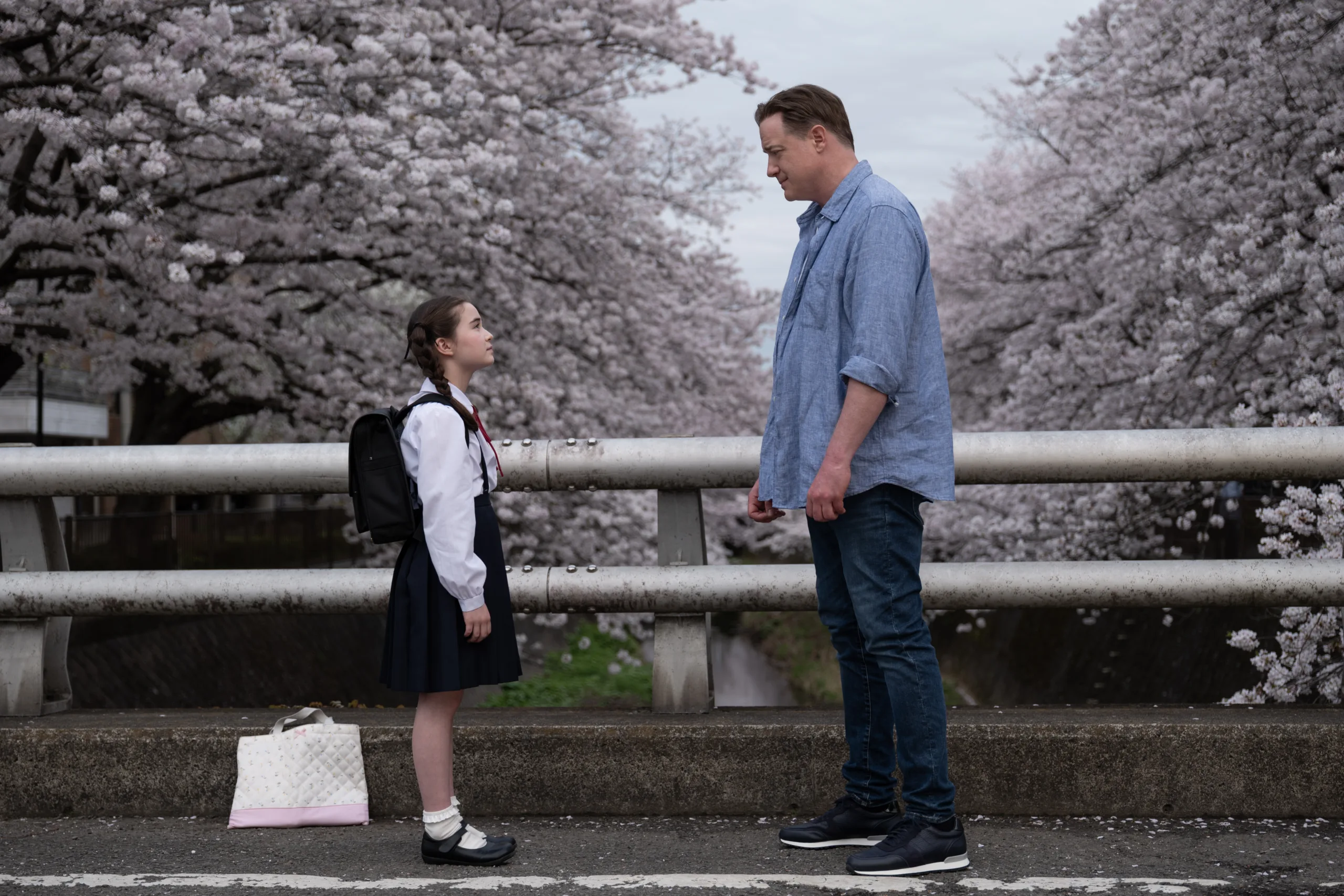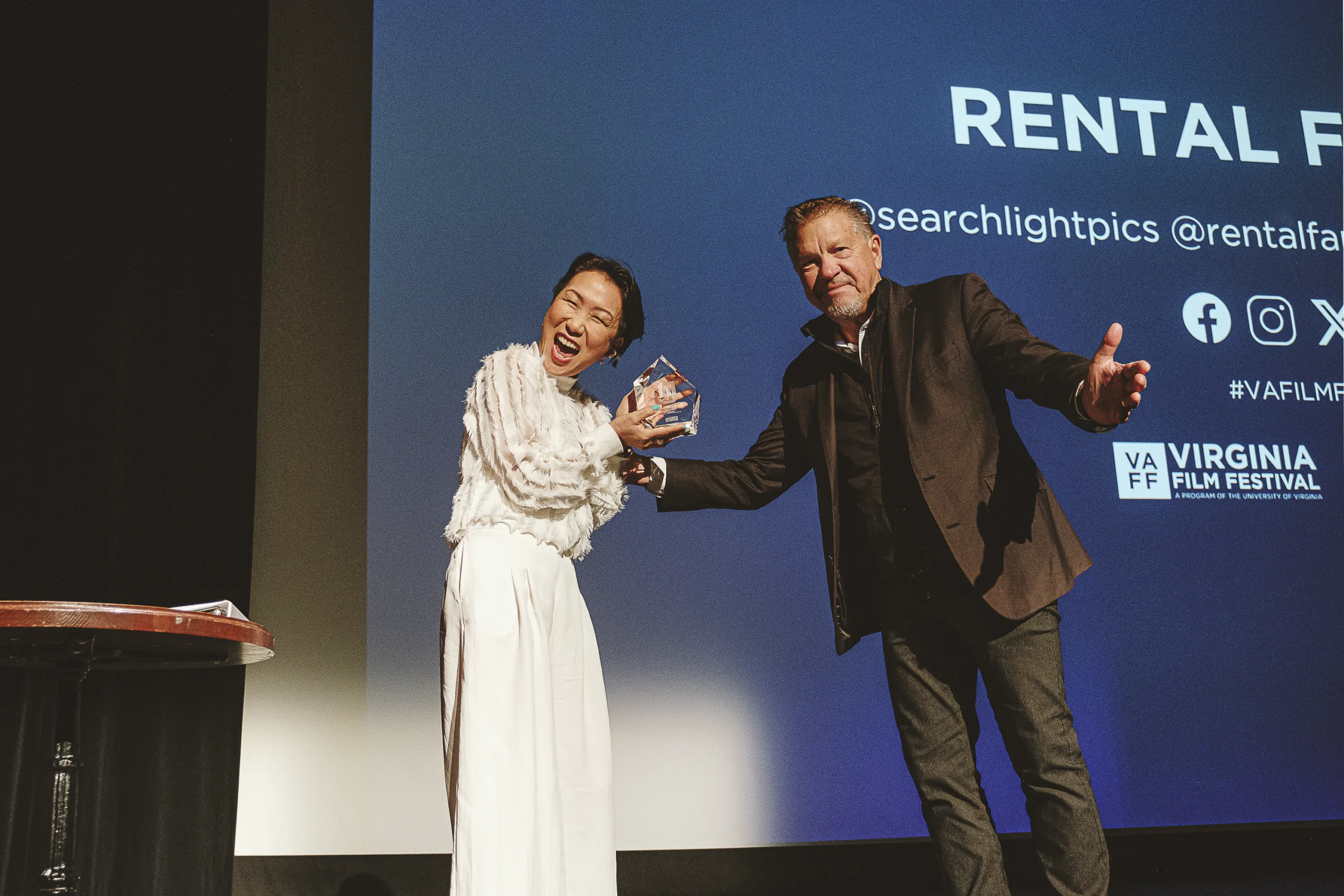Hikari is a hugger. She’s also a laugher, a believer, and a kinetic source of excitement. When she arrived for our talk, she swooped in sporting a fern green shag coat. She immediately gives the publicist a tender, friendly hug. Now, sitting across from me on a mocha-colored couch at Charlottesville Boar’s Head Resort, Hikari chooses between an assortment of multicolored tea packets: Japanese sencha, hot cinnamon spice, Egyptian chamomile, and Earl Gray black tea. She carefully chooses Egyptian chamomile and cheerfully awaits the arrival of some additional honey, ginger and lemon.
Though she hasn’t lost any of her enthusiasm, her voice, as she admits, is quite tired. She’s just arrived from the Chicago International Film Festival with her latest film, “Rental Family,” a Brendan Fraser-led dramedy that premiered at the Toronto International Film Festival. On the day of our conversation she’s set to receive the Virginia Film Festival’s Breakthrough Director award.
“God, the universe, or whatever you want to call it, gave me an opportunity to have millions of random jobs, along with good times and bad times,” says Hikari. “I just feel like I’m meant to put those experiences into my stories.” That unbending faith that hasn’t diluted her humbleness either. When I praise her already varied career, she plays it down. “I’m doing my best. In fact, I’m just starting out,” she says before belting out a loud laugh.
Maybe Hikari’s modesty stems from the fact that it’s been six years since her warmhearted debut, “37 Seconds,” won the Audience Award at the 69th Berlinale’s Panorama section. The caring coming-of-age story about a young woman and aspiring manga artist (Mei Kayama) with cerebral palsy, tracing around Tokyo in her wheelchair, took forever to make, she says. “Nobody wanted to put money into a film about a girl in a wheelchair.” Nevertheless, on the back of the film’s Berlinale success, Netflix acquired her debut. Afterwards, Hikari directed episodes of the streamer’s Emmy-winning bleak comedy “Beef” and a few episodes of HBOMax’s “Tokyo Vice.” During that time, she has worked on “Rental Family.”
The film follows Fraser as Phillip Vandarploeug, a struggling American actor living in Tokyo who is hired by a role-playing company owned by Shinji (Takehiro Hira). On paper, the ‘fish out of water’ story invites comparisons to Sofia Coppola’s “Lost in Translation.” But Phillip, who arrived in Tokyo seven years ago, is neither bemused by his surroundings nor is this a kind of cultural tourism. He genuinely loves the city and the country that’s provided him with a fruitful career that’s now beginning to dry up. He expresses a warmth and naivete, as delivered by Fraser, that gives this delightful film, filled with culturally specific wonder and unlikely gags, its soft center. At this agency, he is hired to mourn at a fake funeral—where the deceased is very much alive in a coffin—and to be a groom to a woman trying to hide her lesbian partner from her traditionalist parents.
If you can believe it, much of “Rental Family” is inspired by reality. Hikari got the idea for the film when, while looking for jobs in Tokyo in 2018, her writing partner, Stephen Blahut, found a role-play rental listing. “What the fuck is this?” Hikari recalls saying, before winkingly asking to excuse her Japanese. “I’d never heard of it before, and I’m Japanese.” As Hikari thought about it, however, the concept wasn’t too outlandish. She shares that when she was 19, she took a job at a department store as a fake smart shopper: One day she’d pose as a student fresh from Italy who was knowledgeable about shoes; the next day, she’d sell makeup on a different floor. Japan is also a country filled with unlikely services, like renting a boyfriend, getting advice from older men (Ojisan Rentals), or paying for a lap for half an hour.
Hikari immediately set out researching rental family services, initially wanting to be one of the actors hired to help people. When that hope fell through, she decided to interview the actors and the people who run these agencies, like the all-woman office she met and the one-man setup whose ingenuity astounded her. The more people she spoke with, the more intrigued she became by why someone would turn to this service.
Hikari believes it stems from the concept of honne and tatemae. “Honne” concerns what a person is feeling, while “tatemae” means “facade.” Rather than showing emotion, one should act as though they’re perfectly content. That desire has stigmatized conversations around mental health in Japan. This service, therefore, provides Japanese people with an easier way to talk to someone who’s not a professional.
“It’s kind of fascinating, isn’t it?” says Hikari with a wide smile. “But it’s also kind of fun.”

Hikari also sees herself in Phillip. Though Phillip has lived in Japan for nearly a decade, he’s still perplexed by some of the customs. When he nearly backs out of being a fake groom—he feels bad pulling the proverbial wool over the eyes of the bride’s family—his co-worker Aiko (Mari Yamamoto) tries to explain to him why this set-up is good for everyone: the bride gets to live with her partner in Canada, while her parents get the happy wedding they’ve always wanted. Phillip initially rejects that idea, causing Aiko to tell him he’ll always be a Gaijin (or a foreigner). While Hikari half-jokingly explains that she often feels that way in Japan—owing to how much time she’s spent in America—she also feels that way in the US.
She first arrived in America as an exchange student, living in Utah with a Mormon family. She didn’t meet any other Asian girls like her until six months into her stay, when she met a girl of Japanese descent who didn’t know Japanese. “You feel isolated because you don’t really get to be who you are. You’re not able to communicate because of the language barrier,” explains Hikari. Her loneliness ended when a girl, who would eventually become a lifelong friend, passed her a note at school.
Consequently, through Phillip, Hikari wanted to flip her experience. “Even if you’re alone in the world, you don’t have to remain isolated,” says Hikari. “That’s why I wanted to make this movie, to share my experience and also let everybody know that we are not alone if we’re trying to understand each other. I’m a firm believer that the only way we can make this world a better place is to understand one another.”
That plea for community and human connection, which is the heart of the film, resides in Phillip’s paternal relationship with Mia (Shannon Mahina Gorman). Mia’s mother, who’s afraid her forlorn 11-year-old daughter won’t perform well on her entrance exam for a competitive private school if she doesn’t meet her estranged father, hires Phillip to be Mia’s dad. Over time the suspicious and spirited Mia begins to soften, developing a healthy, loving bond with Phillip—who comes to take fatherhood seriously. Nevertheless, as you can guess, there’s only so long Phillip can hide that he’s an actor.

Phillip, the character, is also inspired by Hikari’s life. The director was raised by their single mother, alongside an older sister. When Hikari kept asking where her father was, her mother pointed to an actor on television and said that was her father. It was a lie.
“When I tell people that, they gasp,” says a giggling Hikari. “I tell them it’s not that serious. It’s actually really funny. Just wait for it.”
It’s why Hikari doesn’t begrudge her mother’s fib. In fact, she thinks the decision was loving. “I met my father when I was 13. He was not a good person,” explains Hikari. “So my mom telling me a lie about my father was the best lie she could ever give to me. She didn’t want me to meet him because half of me is him.”
Hearing this, I ponder aloud if that’s why both “37 Seconds” and “Rental Family” are about girls with single mothers who find their own created families. She shakes her head in shock. “I guess that’s going to be the theme of all my movies,” she says. And though her face breaks out in her trademark smile, leading to an uproarious laugh that’s both her charm and her defense mechanism, she gradually turns the idea over in her head. “That’s so funny,” she says as the laughter dies away. “I didn’t think about that, but it’s so true.”
Soon, she begins to piece together her films. In “37 Seconds,” Yuma’s mother (Misuzu Kanno) is so protective of her that she restricts where she can go and who she can see. When a manga publisher dismisses Yuma’s submissions as being sketched by a person who hasn’t truly lived, a rebellious Yuma turns to a male sex worker for companionship. While that experience ends poorly, it does introduce her to another sex worker, Mai (Makiko Watanabe), and their driver Toshiya (Shunsuke Daitō), who eventually become her unflinching support system.
They also inspire Yuma to search for her dad. In “Rental Family,” there are three created families: Mia and Phillip; the rental agency and Phillip; and the friendship Phillip forms with Kikuo Hasegawa (Akira Emoto), an aging actor with dementia, whose daughter hires Phillip to pose as a journalist interested in writing a feature about him. Hikari chuckles when she thinks about the abundance of parallel themes she’s crafted in both movies. It’s a consistency that shows how paramount Hikari’s lived experience is to her work, and why her touching films have an unflinching openness.

They’re also fun for her to make. Hikari, in fact, credits Fraser with instilling “Rental Family” with that levity. She knew she wanted to cast Fraser after watching his Best Actor-winning performance in Darren Aronofsky’s “The Whale” at a BAFTA screening. Because Fraser was too sick to take part in the Q&A, he attended via Zoom, which allowed Hikari to become enamored with how Fraser the person came across on a big screen. “When I saw him, I just felt it in my gut: This is the guy,” says Hikari. “He’s so funny and so vulnerable. He can do so much with his face, too. He has that extra thing about him.”
Hikari loves Fraser’s adventurousness, which acutely came across when the pair needed to make a fake commercial for the film. In “Rental Family,” Phillip’s big breakout role—the one that inspired him to stay in Japan—was playing a superhero with a toothpaste-shaped cowl and a toothbrush as a weapon. Weird commercials aren’t uncommon in Japan; they’re often whimsical, fantastical, and cartoonish. And yet, Hikari was taken aback when Fraser told her, “I need nipples.” Despite her saying the body suit didn’t need nipples, Fraser found fake nipples and put them underneath his suit.
While sharing this story, Hikari can’t help but act it out. She leaps from the mocha-colored leather couch. “I want to show it,” she says. “There’s a green screen, and then there’s a guy in the back doing this wave thing.” She crouches down and moves her arms up and down like a fitness guru using battling ropes. “It’s the funniest shit,” says Hikari. “I can’t wait to show it to everybody.”
Though “Rental Family” directly concerns a girl in need of a father, when I asked Hikari if she would use a similar service for herself and for whom, she didn’t give an obvious answer. “I kind of want to have an older brother figure,” she says. “I have an older sister whom I love. But what would it be like to have an older brother?” She asks who I would choose. I’d pick my dad, who passed away when I was 25. “You can pick somebody who looks like your father, too. If your father had a specific tone of voice or a unique way that he walked, you can just ask him to do the exact same thing,” she explains. “They’ll walk into the room as if he walked into the room. You can also give them the same clothes he wore.” The thought of going through that much trouble for a personally planned piece of subterfuge initially troubles me. Wouldn’t a piece of me know this was fake? Wouldn’t, as Phillip wonders, be a lie to myself? But then I’m comforted by the thought of feeling his presence one last time, even if the exercise requires a bit of pretending.
“You should try it,” says an excited Hikari. “It could be kind of fun!” Indeed, it could be. But maybe, like this conversation, our time is simply up. As I begin to leave, Hikari leaps up from the couch once more, not for a handshake. But for a hug as genuine and giving as hot Egyptian chamomile tea, a broad smile and a hearty laugh during a cozy conversation, a heartfelt film whose desire for human connection is so great, only someone with the capacity for childlike astonishment and undiminished empathy could’ve made it. Someone like Hikari.












